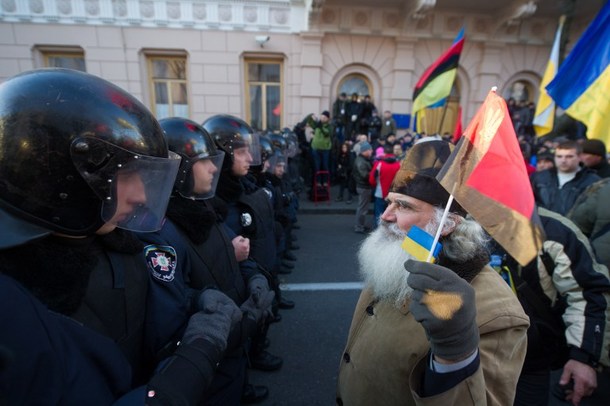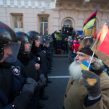
With Ukraine Going Strong, Putin Becomes Lost in Fog of Hybrid War
Publication: Eurasia Daily Monitor Volume: 11 Issue: 210
By:

Last weekend (November 21), Ukraine marked the first anniversary of the EuroMaidan—the public protests in Kyiv that lasted through the hard winter of discontent and brought down the corrupt regime of Viktor Yanukovych on February 21. As its war for state survival continues to rage, the country is in no mood for street festivities. Nevertheless, the EuroMaidan clearly still drives Ukraine’s policy, as was illustrated by the formation of a broad governing coalition pledging to restore the country’s territorial integrity and deepen its pro-Western orientation, including the goal of joining the North Atlantic Treaty Organization (NATO) (Gazeta.ru, November 21). United States Vice President Joe Biden was in Kyiv to express full support for reforms and to warn Russia against further violations of Ukraine’s sovereignty, which would be punished by new sanctions (Lenta.ru, November 21). This warning was reinforced by NATO Secretary General Jens Stoltenberg, who checked the deployment of new military assets in Lithuania and confirmed that the Alliance was carefully monitoring the movements of Russian troops and heavy weapons in eastern Ukraine (Newsru.com, November 21).
Russia’s leadership shows little interest in reflecting on the chain of miscalculations that started with the decision to forbid Ukraine to sign an association agreement with the European Union in November 2013. Moscow is now at a deadlock where it can neither afford to annex the rebel-held territory around Donetsk and Luhansk, nor abandon it (Forbes.ru, November 19). President Vladimir Putin held a meeting of his Security Council last week and ordered to effectuate a strategy of pre-emptive measures against extremism exemplified by “color revolutions,” which were propagated by “anti-national thinking” about “a violent overthrow of the existing regime” (Kommersant, November 21). This discourse betrays deepening fear about a sudden explosion of mass protests, which would break through the shields of the OMON (Russian riot police), despite the fact that Russia is one of the most heavily policed states in the world (Moscow Echo, November 22). Meanwhile, Foreign Minister Sergei Lavrov showed a different side of the same fear, arguing that Western sanctions are aimed at “regime change” in Russia by ruining its economy (RIA Novosti, November 22).
The economy is indeed sinking into a recession so fast that the government is unable to produce any meaningful set of guidelines for Putin’s annual address (due on December 4) and all its ministers could be collectively sacked, according to informed insiders such as Alexei Kudrin (RBC, November 22). The state budget for 2015, approved by the State Duma last week, is based on the premise of oil prices at $100 per barrel and envisages growth in the range of 3.3–1.2 percent, so the inevitability of severe cuts in expenditures is beyond doubt (Slon.ru, November 21). Liberal economists, who try to preserve the goals of modernization and seek to curb inflation, are increasingly marginalized by traditionalists who demand a “patriotic” mobilization of economic resources (Novaya Gazeta, November 19). Their prescriptions for rigid control over prices and capital flows fit well with the political discourse on confronting the hostile West, but the problem is that such state-owned giants as Rosneft or VTB Bank, controlled by Putin’s associates, are not at all interested in such mobilization and, for that matter, refuse to work in the newly annexed Crimea (Moscow Echo, November 21).
Putin is stuck between the political need to deliver a new victory to the hyper-agitated “patriotic” camp, which continues to spin the vicious propaganda campaign, and the economic imperative to prevent an implosion similar to the one that determined the collapse of the Soviet Union not quite 25 years ago. He would have probably opted for a wise strategy of doing nothing, but every attempt to assess the year’s gains and losses since he made a determined effort to prevail over the Ukrainian EuroMaidan brings a disappointingly negative outcome (Slon.ru, November 21). The spike of enthusiasm over the spectacular annexation of Crimea cannot be sustained, whereas the irritation over the deteriorating quality of life, exemplified by the fetid smog that has covered Moscow in the last couple of weeks, is set to grow (Gazeta.ru, November 21). Putin needs to shift public attention toward exaggerated security threats, but Moscow’s officially stated demand for rock-solid guarantees of Ukraine’s non-accession to NATO is not going to receive even a politely ambivalent response (Vedomosti, November 20).
The greatest setback in Putin’s proactive maneuvering amid the Ukraine crisis is probably the profound alienation from Europe, which—against his expectations—has not succumbed to the usual bitter quarrels but mostly found determination to stand united against his blatant blackmail. Germany has provided mature leadership in forging this common front, and Chancellor Angela Merkel wasted more hours in fruitless conversations with Putin than all her other peers put together. However, the long face-to-face meeting with the Russian president at the G20 Brisbane summit apparently exhausted her patience (Novaya Gazeta, November 18). German Foreign Minister Frank-Walter Steinmeier traveled to Moscow last week and had a late-evening meeting with Putin, but the only result was the cancellation of the traditional dialogue meeting of the St. Petersburg forum (Gazeta.ru, November 22). This firm rejection has probably hurt Putin more than the sharp affront from Lithuania’s President Dalia Grybauskaite, who called Russia a “terrorist state” (Moskovsky Komsomolets, November 21).
Both Russia and Ukraine have travelled far during the year since the EuroMaidan exploded, and if the latter is united as never before around the effort to assert its European identity, the former is sleep-walking to yet another state failure, intoxicated by the fumes of its jingoist policies. Putin seeks to achieve new stability in the midst of the “hybrid war” of his own making, but his seemingly solid domestic support is just a thin crust on shifting social sands eroded by economic misfortunes. He tries to deter the hostile West from exploiting this weakness by using military and even nuclear brinksmanship, but this requires steely precision—and he is constantly irked by the lack of respect to his petulant persona. He cannot slow Russia’s sinking into recession, so he has to stop Ukraine’s recovery from the near disastrous encounter with the specter called “Novorossiya.” Every day in the current pause brings him new setbacks and insults, and every Rubicon he has crossed granted him a moment of triumph before delivering Russia deeper into the hole of a losing confrontation. He is now set to savor another bold move but may be worried that it could be his last one.




